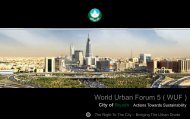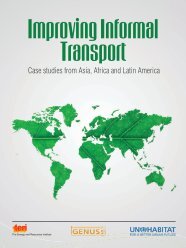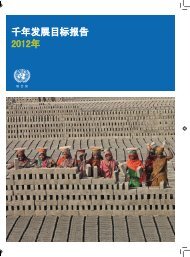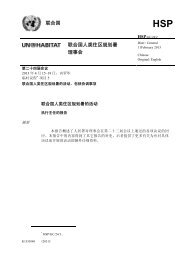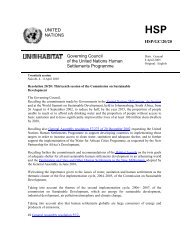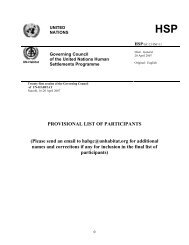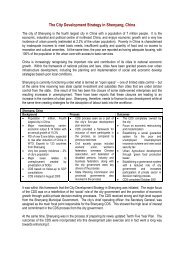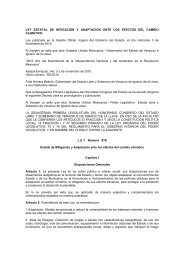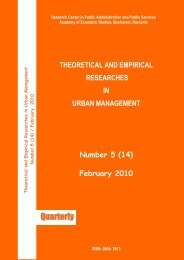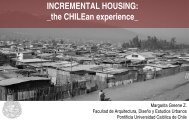Harmonious cities - UN-Habitat
Harmonious cities - UN-Habitat
Harmonious cities - UN-Habitat
Create successful ePaper yourself
Turn your PDF publications into a flip-book with our unique Google optimized e-Paper software.
IN-FOCUS Tourism and culture<br />
As far back as 1984, when Los Angeles<br />
hosted the Olympics, the city clamped down<br />
on car exhaust emissions and Beijing’s fight<br />
against smog was a heavy feature of news bulletins<br />
leading up to this year’s Games. The relocation<br />
and temporary shutdown of several<br />
polluting factories and the heavy restrictions<br />
on traffic had a positive effect on Beijing’s<br />
Since Atlanta, security has been key to staging an<br />
Olympic bid Ph o t o © lA r S Su n d e r S t r o m<br />
smog-filled air. Despite media criticisms in<br />
the lead-up to the Games, the situation improved<br />
in time for the opening ceremony.<br />
42<br />
u r b a n<br />
WORLD<br />
November 2008<br />
Beijing’s Internet technology also played a<br />
part in cutting congestion and consequently<br />
reducing pollution. Taxis were connected to<br />
China’s next-generation Internet (CNGI) via<br />
IPv6 sensors, which directed them away from<br />
heavy traffic. CNGI was also used to broadcast<br />
events online and control venue facilities,<br />
according to the Beijing Review.com.<br />
Greenpeace pays tribute to the use of technology<br />
in its August 2008 report China after<br />
the Olympics: Lessons from Beijing which<br />
praises the implementation of energy-saving<br />
technologies, including the launch of a fleet of<br />
buses run on compressed gas, the opening of<br />
the Guanting wind power station and the help<br />
given to 32,000 households who converted<br />
from coal heating systems to electric. For<br />
future Games, Greenpeace recommends that<br />
water-saving technologies should be applied,<br />
a zero-waste policy implemented and an internationally<br />
recognised timber procurement<br />
policy is employed in relation to the construction<br />
materials used.<br />
Sydney is perhaps the best example of a<br />
Games which had excellent environmental<br />
controls as well as respect for people’s housing.<br />
The city received praise for its solar-powered<br />
Olympic village and the self-powered<br />
stadiums, from which excess electricity was<br />
routed back into the national power grid. And<br />
rather than choosing to construct the main<br />
Olympic complex on land where poor communities<br />
were already residing – as Seoul,<br />
Barcelona and Atlanta had done – Sydney<br />
used government-owned wasteland.<br />
As well as environmental considerations,<br />
security is another issue of paramount importance<br />
for the Olympic Committee. In<br />
1996, Atlanta’s organising committee naively<br />
ranked terrorism threats behind worries<br />
over heat-related illnesses and soccer violence<br />
and a bomb went off in the crowd killing<br />
two people. Since then security has been<br />
key to staging an Olympic bid. In 2004, the<br />
Athens Olympics were protected by the most<br />
expensive security operation in Olympic history.<br />
According to a report in the Wall Street<br />
Journal on 22 August 2004, Greece deployed<br />
70,000 troops and installed more than 1,000<br />
high-tech surveillance cameras. China employed<br />
more than 100,000 security personnel<br />
during this year’s Games, plus surfaceto-air<br />
missiles within range of sports venues,<br />
according to a report by Aljazeera news on 6<br />
August 2008.<br />
Tight security measures are essential,<br />
but so is the necessity to provide efficient,<br />
cost-effective and environmentally friendly<br />
transport. Beijing ordered half the city’s vehicles<br />
off the roads during the Olympics, but<br />
compensated by mobilising 33,000 drivers<br />
and enhancing public transport. China’s efficient<br />
plan illustrates how money spent on<br />
transport not only enables people to move<br />
around the city easily both during and after<br />
the Games, but also demonstrates a knock-on<br />
effect of cutting pollution through reducing<br />
car exhaust emissions.<br />
Sustainable development and the re-use<br />
of buildings are also essential. The infrastructure<br />
built has to provide a lasting legacy while<br />
considering the needs of the local population.<br />
London’s 80,000-capacity arena will be converted<br />
into a 25,000-seater stadium for use by<br />
local community sports clubs after the Games<br />
and its Olympic village will be used as 3,500<br />
affordable homes with parks, open spaces,<br />
community facilities and transport links.<br />
Sebastian Coe, Chairman of the London<br />
Organising Committee wants London to<br />
be the first “public transport” Games. USD<br />
30 billion (STG 17 billion) is being spent on<br />
transport: 10 rail links, a 12-carriage Olympic<br />
Javelin shuttle, new buses, and refurbishment<br />
and upgrading of the London Underground.<br />
A plan for an east-west rail link had<br />
previously been shelved, but the Olympics<br />
has made its construction possible.<br />
On the surface, hosting the Olympics is a<br />
noble endeavour, but the aspirations of potential<br />
host <strong>cities</strong> to stage the world’s biggest<br />
sporting event are often based not on global<br />
unification but a desire for urban redevelopment<br />
– which has both positive and negative<br />
consequences. The Olympics has enabled all<br />
of its host <strong>cities</strong> to enjoy the benefits of improved<br />
transport systems, cleaner air, more<br />
effective security, employment opportunities<br />
and a higher standard of sporting venues.<br />
Host <strong>cities</strong> should be encouraged by the IOC<br />
to realise, that although staging the Olympics<br />
provides a fantastic opportunity to improve<br />
their city — and to attract investment and<br />
tourism — it is wrong to sweep aside the lowest<br />
socio-economic groups who reside in areas<br />
that are used for Olympic infrastructure.<br />
The IOC has worked hard to choose <strong>cities</strong><br />
which propose sustainable development but<br />
it should also ensure the benefits brought by<br />
the Olympics are benefits for all.



